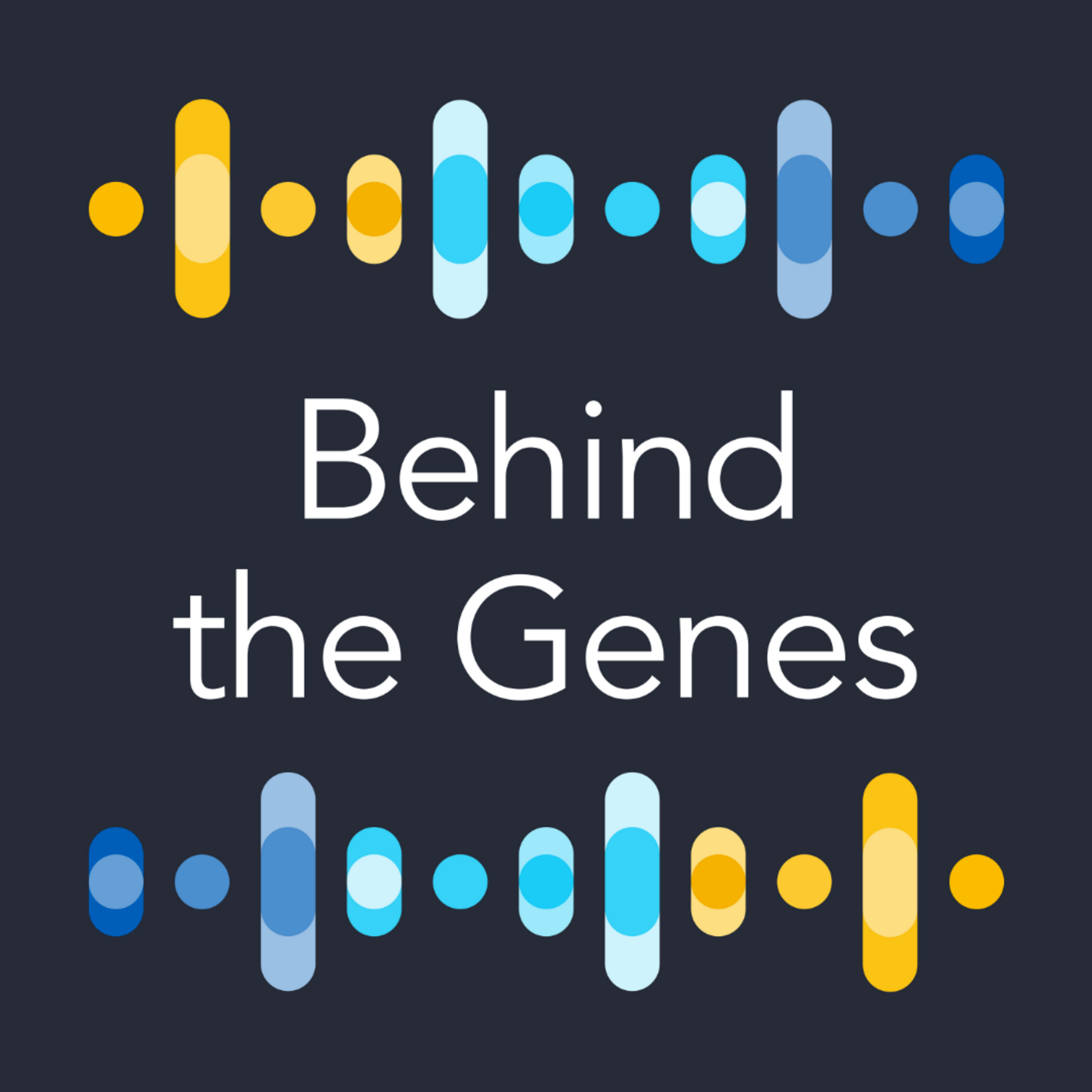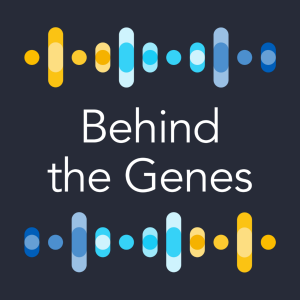
We are Genomics England and our vision is to create a world where everyone benefits from genomic healthcare. Introducing our refreshed podcast identity: Behind the Genes, previously known as The G Word. Join us every fortnight, where we cover everything from the latest in cutting-edge research to real-life stories from those affected by rare conditions and cancer. With thoughtful conversations, we take you behind the science. You can also tune in to our Genomics 101 explainer series which breaks down complex terms in under 10 minutes.
Episodes

Wednesday Mar 06, 2024
Helen Brittain: Genomics 101 - What is a variant of uncertain significance?
Wednesday Mar 06, 2024
Wednesday Mar 06, 2024
In this explainer episode, we’ve asked Helen Brittain, Clinical Lead for Rare Disease Diagnostics at Genomics England, to explain what a variant of uncertain significance is, in less than 10 minutes.
You can also find a series of short videos explaining some of the common terms you might encounter about genomics on our YouTube channel.
If you’ve got any questions, or have any other topics you’d like us to explain, feel free to contact us on info@genomicsengland.co.uk.
You can download the transcript or read it below.
Naimah: What is a variant of uncertain significance? Today I’m joined by Helen Brittain, who’s the clinical lead for rare disease diagnostics at Genomics England, to find out more. So first of all, Helen, before we dive into the topic, I’d like to go one step further back and ask you to explain what is a gene?
Helen: A gene is effectively a section of our DNA, which is our genetic code, and it contains an instruction, something important about how we grow, how we develop, how we function as a human. Humans in total have around 20,000 genes, which is our complete set of instructions, to tell us everything we need to know about ourselves.
Naimah: So, what are gene variants then, and do they all have an effect?
Helen: Variants are effectively differences within genes. So genes, like I said, are instructions, and they have a particular way that they’re spelled out and structured, so that the body can understand them and make sense of that instruction. A variant is where there’s something different about the way that that gene is spelled out or structured that could affect how it works, and basically a variant is a difference to what we expect to see.
Naimah: And do all of these have an effect?
Helen: So no, not all of them will have an effect. Some differences or variants within a gene may not affect the way it works at all, whereas others might alter that gene so significantly that it can’t do its job anymore, and could be very significant for that person’s health.
Naimah: And how do we find these gene variants?
Helen: Gene variants are exactly what we’re looking for when we’re trying to find a diagnosis for somebody. So, somebody with a rare condition is likely to have an underlying difference within their genes that would be the explanation for it. We’re finding these through doing genetic testing or genomic testing, so looking at an individual gene, a series of genes, or even across someone’s entire genetic code, through whole genome sequencing, and we find these variants through doing that testing.
Naimah: And this might be a good opportunity to mention our other Genomics 101 episode on genetic testing, if you’d like to find out some more information on that as well. So, moving on with the next question, how is a variant’s significance determined?
Helen: Variants, as we say, come from the genetic tests we undertake, and there are a team of people who look at and try to determine what effect that variant might have on that person. This is the majority of the time the work done within the laboratory teams, through the clinical scientists, who have expertise in understanding the impact of variants within a gene, and they work together with other clinical representatives, like the clinician looking after the patient, to understand that patient’s disease in as much detail as they can, to try to pull all of the information together and determine whether that variant is making a difference or not.
They would look at a lot of different pieces of information to try to work out, could this be the reason behind that person’s genetic disorder? And that might be things like have we seen it before, can we predict the effect of that variant on the gene? And we have to understand how variants within that gene cause a condition to be able to match up against the variant that’s seen, as to whether that would make sense for that individual. So, it’s a lengthy process but an important one, to make sure that we’ve got the most accurate information about that variant, and the understanding about that in that person’s health and development.
Naimah: So then, what would be a variant of uncertain significance?
Helen: So, the output of that clinical scientist’s work looking at whether a variant is significant or not comes out into five categories, but three main groupings. What we’re looking for obviously through doing genetic testing is to try to find a diagnosis for somebody, and a diagnosis would be a place where we are confident that that variant impacts on that gene and leads to the condition that that person is presenting with. So, that would be a diagnosis on one end of the spectrum of what we might find.
On the very other end of the spectrum are variants that don’t make an effect on the gene, that would be benign. We would call those harmless variants, things that don’t change the gene and wouldn’t be expected to be associated with a condition.
And then, in life there’s always a grey area, and the part in the middle, between being confident about a diagnosis on one end or being confident that that variant really doesn’t impact the gene and is harmless. We have variants that we find that we do not yet understand, and that’s basically because our knowledge as of when the variant is looked at is good, but it’s not perfect. There could be more to learn about particular variants or particular conditions, but at the moment we just don’t have enough information to be sure one way or the other. And that’s really important, we’ve got to get it right, so we do have this grey area in the middle, which are the variants, differences in the gene, where the significance of them on that person is uncertain.
Naimah: How often do we find these variants of uncertain significance when we’re trying to genetically diagnose patients?
Helen: They are relatively common for us to encounter, and that’s for a number of reasons, I would say. I think that we know a lot about our genes, and our knowledge has come on leaps and bounds, and it’s still improving at a rapid rate, but we don’t know everything yet, so there will be areas where we haven’t met a particular variant before, or we can’t predict how it might affect that gene, or there’s some uncertainty about it because we don’t have full knowledge yet. So, it does happen relatively commonly, and it probably happens more commonly the more genes or the more information we’re looking at. So a test looking across someone’s genome, like whole genome sequencing, we’re more likely to come across these things than if we’re doing a very targeted test looking at one specific gene that we understand very well, for example.
Naimah: And how can knowing the significance of a gene variant be impactful for clinicians and the patient?
Helen: This is really important, knowing the significance of a variant is key. It’s fundamental to genetic testing, because we are trying to make a confident diagnosis for somebody, and we have to get that right, because if we make a diagnosis in somebody there are lots of knock-on implications of how that information is used to inform the healthcare of the individual who has the condition, or maybe even to inform their family members, who could be at risk of the same condition. Obviously, we share our genetic information amongst our families, and so a genetic test might be used for a family member as a result of a diagnosis in one individual within their family.
And of course, in some situations, that might lead them into either needing screening for a particular condition that could happen, or being removed from screening if they don’t have the genetic cause within their family. Equally, people might make choices surrounding whether to extend a family or reproductive choices around the knowledge of a genetic condition within a family. So you can see, the implications are huge. It’s really important this is correct.
Naimah: And finally, I just wanted to ask, can we reclassify variants of uncertain significance?
Helen: Yes, there’s real need to do this because people are wanting genetic diagnosis answers for understanding, and for all of the implications we just mentioned about why are diagnoses important. So yes, we can reclassify variants of uncertain significance, and that can happen in different ways. It’s not always possible straight away, unfortunately. So, what we often need is time, and that is time to understand that variant a bit better, and that might be through seeing it again in other people, maybe who have the same pattern of health problems or same picture in terms of their rare disease, and we start to understand, okay, that might actually add up to suggest that that variant is affecting the way that gene is working. Or equally, we might see it in other people who don’t have the same rare disorder, so we’re starting to see, well actually, maybe it’s harmless and it’s just part of the natural genetic differences we all have.
The other way that we can understand variants of uncertain significance better would be through research, so for example researchers looking at designing studies to try to see if they can make a model, for example, with an animal who might have the same type of variant, and see if that causes an effect on their health, so learning specifically about that variant through research could also help. And there are things that clinicians also actively try to do, and this is why we work together with the clinical scientists is to understand, are there other people within the family with the same rare condition, and would it help to test them to see if they also share the same rare variant. And sometimes that can help, not always. So yes, we really want to try to reclassify variants of uncertain significance, and as far as possible, we will, but sometimes they do just need that time for us to build that bigger picture.
Naimah: That was Helen Brittain explaining variants of uncertain significant. I’ve been your host, Naimah Callachand, and if you’d like to hear more explainer podcasts like this, you can find them on our website at www.genomicsengland.co.uk. Thank you for listening.

No comments yet. Be the first to say something!